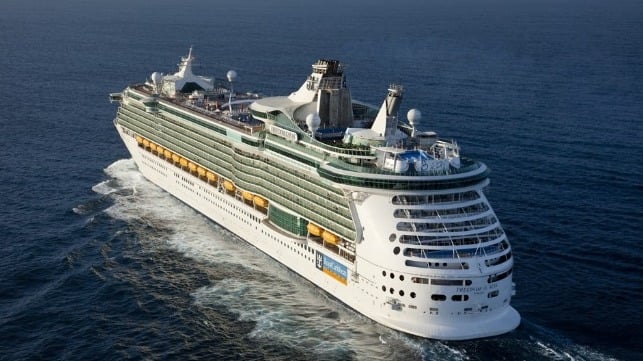CDC Permits First Cruises to Sail from U.S. Ports Starting in June

The efforts to resume cruising from U.S. ports took a step forward with the U.S. Centers for Disease Control and Prevention issuing its first provisional acceptance letter for a simulated cruise and late today saying it would also permit the first fully vaccinated cruise ship to resume sailing in late June. The Royal Caribbean Group announced that two of its brands will operate the first cruises from U.S. ports since March 2020.
Royal Caribbean's premium cruise line Celebrity Cruises received permission to restart revenue cruises as of June 26. The company said that its cruise ship the Celebrity Edge will begin service requiring all adult passengers to be vaccinated and children, first at age 16 and as of August at age 12 and up, to also be vaccinated. In addition, the company will need to vaccinate the crew aboard the ship to qualify for the exemption not to operate a simulated cruise to prove its health protocols. The statement only said that the ship would sail from Port Everglades, with additional details on the cruises to be announced.
We’re making history today! After receiving the green light from the CDC, #CelebrityEdge will set sail from Fort Lauderdale on June 26, making her the first ship to sail US waters once again.
— Celebrity Cruises (@CelebrityCruise) May 27, 2021
Reserve your spot to tour the Caribbean aboard the stunning Celebrity Edge! pic.twitter.com/j2vYj4VZGP
The company's Royal Caribbean International brand also received provisional acceptance to operate its first simulated voyage in June. The CDC issued a letter to Royal Caribbean on May 25 informing the line of its provisional acceptance of the application to operate a simulated cruise aboard the line’s 156,271 gross ton ship the Freedom of the Seas between June 20 and 22, 2021. President and CEO Michael Bayley announced the news in a social media posting saying, “After 15 months and so much work by so many during very challenging times. To all our colleagues, loyal guests and supporters all over the world I am proud and pleased to share some bright and wonderful news! Boom! Onwards and upwards team!”
The line has permission to operate the trip provided they meet CDC requirements, including green or orange status for the ship meaning that crew movements and potential exposure to COVID-19 have been limited under the CDC’s rules. Volunteer passengers have to be advised that they are on a test cruise and informed of the CDC’s travel notices and requirements before the trip.
The purpose of the simulated cruise is to test the ship’s health and safety protocols and document to the CDC the operations as well as any deficiencies. The ship must carry at least 10 percent of the maximum number of passengers the line plans to carry when it returns to service and all the passengers and crew have to agree to COVID-19 testing before and after as well as post cruise tracing to ensure no one is infected with the virus. In normal operations, the Freedom of the Seas carries 3,943 passengers (double occupancy) or a total of 4,553 passengers plus 1,447 crew.
While the provisional acceptance of the request to conduct a simulated voyage is a key step for the company, the line must demonstrate to the CDC that the protocols are working, and only then will they be granted a Conditional Sailing Certificate to resume revenue trips. The CDC accepted Royal Caribbean’s port agreements as required in Phase 2A of the Conditional Sailing Order, which mandated that the line have plans and agreements with the ports to manage a potential outbreak of the virus aboard the ship and how passengers or crew would receive medical treatment.

that matters most
Get the latest maritime news delivered to your inbox daily.
Royal Caribbean International elected to operate the simulated voyage as opposed to certifying to the CDC that 95 percent of passengers and 98 percent of the crew were fully vaccinated on each cruise. Each of the cruise ships Royal Caribbean International plans to return to service sailing from U.S. ports, including the two ships planned to sail for Alaska starting in late July and August, are required to go through the same process with port agreements and simulated cruises unless they certify vaccinations for passengers and crew.
The ship that Royal Caribbean International chose to operate its first cruises, the Freedom of the Seas, had received a $116 million modernization completed weeks before the pandemic causes the suspension in cruising. The line added new water park and entertainment features as well as enhanced dining options for passengers during the renovations.
